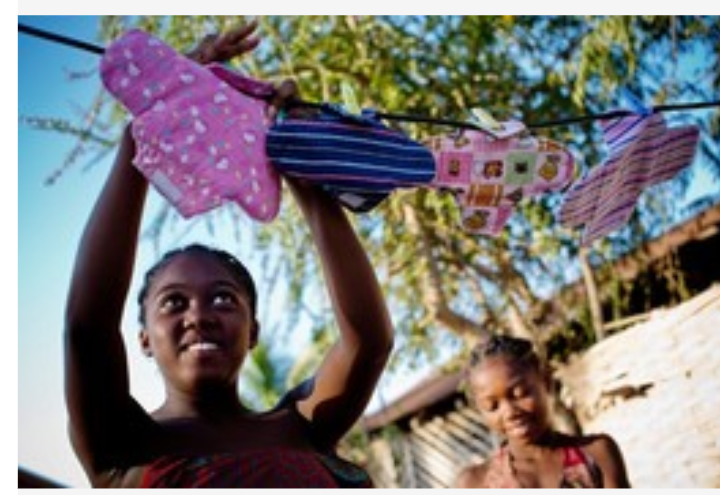In commemorating this year #MenstrualHygieneDay, Wateraid Nigeria has implored the stakeholders in Water Sanitation and Hygiene sector in Nigeria to be proactive in promoting better menstrual hygiene amongst girls and women in the country.
This organization made this known in a statement released today May 28th – a day sets aside every year to commemorate the improved menstrual health and hygiene amongst women across the globe.
According to the statement, “As countries have been forced into lockdowns to fight the spread of Covid-19, women and girls across the globe are facing increasing struggles to access the sanitary products and facilities they need to manage their periods hygienically and with dignity”
“The international charity says the pandemic has exposed and exacerbated gender inequalities and on this year’s Menstrual Hygiene Day, WaterAid is calling for menstrual health and water and sanitation provision to be prioritised in the long-term responses to the Coronavirus outbreak.
“Every day, approximately 800 million women and girls are on their periods, yet one-third of this population do not have access to clean water, female-friendly, decent and private toilets, hygiene facilities and sanitary materials to manage menstruation with dignity. Sadly, a lack of access to these essentials result in poor menstrual hygiene practices among women and girls, keeping from reaching their full potential.
“This dire situation is further compounded by the taboo and stigma surrounding talking about periods which holds women and girls back from being able to ask for the facilities and support they need – including decent, private toilets with water and soap – to deal with their menstruation with dignity and comfort.

“Inadequate water, sanitation and hygiene (WASH) facilities in public places, such as schools, workplaces and healthcare facilities pose a major obstacle for women and girls, making it more difficult to manage their periods hygienically and with dignity. Current statistics reveals 25% of women in Nigeria lack adequate access to sanitation facilities that allows for privacy for defecation and menstrual hygiene management (MHM). Also, according to the United Nations, one in ten girls in sub-Saharan Africa misses school during their menstrual cycle, adding up to as much as 20% of the school year.
“Even in the best of times, gender inequality, discriminatory social norms, cultural taboos, poverty and lack of basic services often cause menstrual health and hygiene needs to go unmet, particularly for the poorest and most vulnerable in the society. In emergencies, these deprivations can be exacerbated. During the pandemic, some shared or public toilets have closed or not been disinfected regularly, resulting in safety risks for those who rely on these facilities. Others have found it harder to get water at a time when households need to wash their hands more regularly and may not have sufficient water for menstrual needs. The result is far-reaching negative impacts on the lives of women and girls: restricting mobility, freedom and choices; reducing participation in school, work and community life; compromising safety; and causing stress and anxiety.
Globally, women make up 70% of the health workforce and are more likely to be front-line health workers, especially nurses, midwives and community health workers. Poor water, sanitation and hygiene (WASH) infrastructure in healthcare facilities means female health workers and patients, including those in isolation, testing and treatment centres, cannot manage their menstruation adequately. This compromises not only their health and dignity, but also the ability of the health system to deliver quality and effective care. Furthermore, the lockdown situation intensifies the impact of household level taboos and stigma on women and girls, making it more difficult to manage periods without shame and discomfort in often confined spaces.
According to Evelyn Mere, WaterAid Nigeria Country Director,
“The COVID-19 pandemic although a global problem, affects women and girls disproportionately. The economic impact of COVID-19 forces women and girls to prioritise other essential needs over sanitary menstrual products, thereby increasing period poverty. Poor water, sanitation and hygiene facilities in homes, communities and healthcare centres mean millions of girls and women, female health workers and patients are unable to manage their menstruation with dignity. This should not be normal.
“As governments across the world work round the clock to contain the Covid-19 pandemic, attentions have rightly been focussed on vital life-saving measures such as health care and the provision personal protective equipment. However, periods do not stop during pandemics. Disrupted water and sanitation services and supply chains for period products means many people are finding it much more difficult to access everything they need to manage their periods. This combined with a lack of privacy under lockdown and the closure of services at schools, health centres and communities that provide menstrual health products, information and help tackle menstrual stigma, risk halting or even reversing the enormous progress that has been made towards better menstrual health globally.
“As we emerge from lockdown restrictions and develop long-term solutions to the crisis, now is the opportunity for government at all levels to prioritise the provision of clean water, good sanitation and hygiene – not only critical in the fight against coronavirus but also essential for women and girls to manage their periods.”
“We are calling on the government of Nigeria to help unlock the potential of women and girls by increasing access to clean water, decent toilets and good hygiene in homes, communities, schools, public places and healthcare facilities. Menstruation is a human rights issue and when women and girls cannot manage their periods, other rights such as to water and sanitation, health, education and dignity, are being violated.
WaterAid is continuing its work throughout the pandemic to provide clean water, decent toilets and good hygiene to people living in poverty, including helping vulnerable people and communities receive important information around how to manage periods hygienically, while dispelling taboos around menstruation.”
